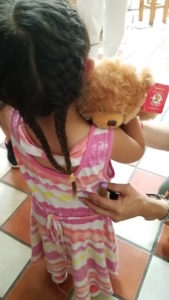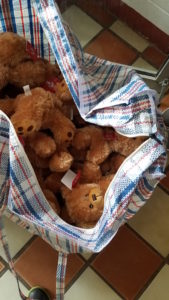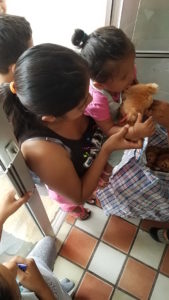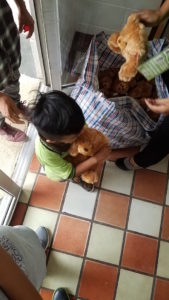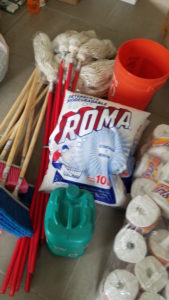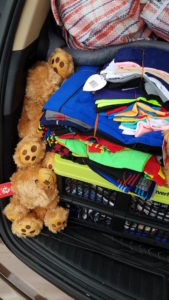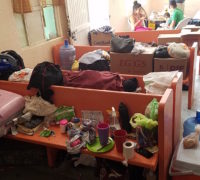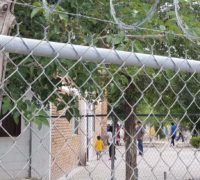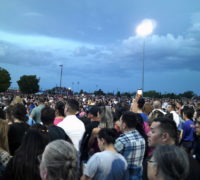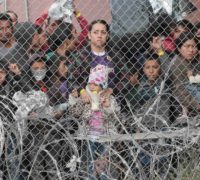Ciudad Juarez – Today we journeyed on a Teddy Bear mission.
Along with the comfort given to children by the brown, toy “stuffies,” we spent considerable time on the inside of the Casa Del Migrante in one of Juarez’s seemingly endless broken neighborhoods.
Drab grey cracking concrete and cinder block crumbling into worn patches of dirt alongside bumpy, pock marked streets. Tired, scraggly trees offered little relief from the hot summer sun. Charred ruins of what were once stores are a common sight. Their owners didn’t pay the price demanded by the cartels to remain in business. Consequently, they burn.
With this as a backdrop Dr. Eva Moya, a University of Texas at El Paso Associate Professor of Social Work, opens the trunk of her brown SUV. Plush brown Teddy Bears almost pop out of the hatchback as if they were anxious to “meet” the migrant children they would soon comfort. The vehicle is also packed with plastic flip-flop shower shoes, underwear of all sizes for both children and adults. Cleaning supplies, toilet paper and other commodities fill the pickup truck of Dr. Moya’s friend Margarita Zarate, who assisted us on the mission.
At the same time we take inventory of the products, a Mexican federal police vehicle pulls up nearby. Masked Armed officers appear dressed in black carrying scary looking weapons resembling the rifle used to murder 22 Hispanics at an El Paso Walmart two days earlier.
We’d later learn that nine migrant boys, ages 11-14 escaped from the Casa Del Migrante, getting through the razor wire and locked doors. The concern is that they were either kidnapped by a gang or joined one.
This is not the movies, fiction or a Netflix series to binge. This is a mid-Monday morning just over the El Paso border in Juarez.
The bear distribution is at first slow as we await clearance from Casa Del Migrante Executive Director Riveria Blanca.
In a line supervised by adults, children enter the center’s lobby. JSurge is given permission to photograph, but only from behind the children’s heads. One at a time, the bears, donated through the Good People Fund (see sidebar) are distributed to the children. Each child’s name is printed on an ID label on each bear.
Nearby colorful statues of Jesus and Mary almost stare with fixed gazes at the children. Hundreds of rosary beads drape the statues. Nearby a young father sits on a worn sofa, his two toddler sons climbing over him. Playful energy, seemingly, left their papa along the family’s journey.
Some of the children squeal with happy delight. Others seem so tired and bereft of emotion that their sad eyes almost cannot believe they are receiving gifts.
Ms. Blanca takes us into a nearby office. She has been at Casa Del Migrante for over 10 years. On her T-shirt are printed the words Todos Somos Migrantes or “We Are All Migrants.”
The center’s population is mostly made up of Central Americans and Mexicans. Everyone is either trying to gain US asylum or has learned that they’ve been denied. A bus, looking no comfortable than a school bus, in fact, awaits outside to take people back to Guatemala, the nation they hoped to never see again.
“We get many people here who are awaiting a decision on their asylum application,” said Ms. Blanca, the center’s executive director. “There are those here who have been denied asylum in the US are awaiting a safe trip back.”
Back can be to another state in Mexico or to Guatemala, Honduras or other nations to the south.
The center has hosted migrants from Cuba, the former Soviet Union and African nations such as Uganda.
At Casa Del Migrante, migrants, who often show up in difficult, haggard conditions, are given a shower to start off, a towel, new clothing, hygiene products, meals and medical check ups. The stay can last for just a handful of days for up to four months.
The Casa Del Migrante has hosted as many as 1,010 migrants at a time. They come in after deportation from the US by ICE (Immigration and Control Enforcement) officers and they arrive in droves, delivered by smugglers coming from the south. The ICE drop offs happen every Tuesday and Thursday.
There are those who have been turned down for US asylum. Then there are many who await a court US asylum court date. Wherever and whenever they come, it’s been a long journey. Ms. Blanca said that “everyone has a story.”
“The people have extortion, death or abuse facing them back home,” she said. “They are considered foreigners here in Juarez. They are called the ‘returned population.’”
Ms. Blanco says that there “seems to be a war against the children. They all suffer from vulnerability, a lack of self esteem. They have been bruised in some way.”
“Migration and immigration will always exist,” she adds.”
Then Ms. Blanco turns the conversation to President Donald Trump, and her opinion of him is hardly pretty.
“I remember his words,” she tells JSurge. “He referred to migrants as trash and shit.”
The experience of the migrants deported from the US has at least psychologically gotten worse since Trump became President, she said.
“I am saddened,” she said. “You give 100 percent plus to the migrants. You have to be their friend. Some of the women who come here have experienced violence in their home countries. We had a 21-year-old mother of one who came here because her own father tried to sell her to a gang. We have women here who are still breast feeding.”
The migrants also come north in serious financial debt, borrowing thousands of dollars to pay smugglers anywhere from $3,000 to $6,000 per person.
“They sell their homes or borrow money that they’ll never be able to pay back,” she said. “We’ve had families with as many as nine children come here.”
Ms. Blanca said that many of the children experience a different sort of behavior when they come to the migrant centers. They see their downtrodden parents, she said, and they try to take over as if they were the adults.
“They want to solve the problems of their parents what ever they might be. It’s just so sad. Many of the children feel if they work hard here at the shelter, it will somehow get them asylum.”
Ms. Blanca also has a different take on the immigrants’ situation should they be denied asylum. She encourages those rejected to seek Mexican asylum.
“I don’t want to see the migrants go back to the other side where they came from,” she said. “And no green dollar bill is worth your life. To go back to a place like Guatemala is bad. I’ve seen extreme drug use and the brutal results of sex trafficking from our clients.
The woman whose father tried to sell her to cartels. She, according to Ms. Blanca, was granted US asylum.
Outside, three little girls sit on the grass and look through a chain link fence from the inside. The razor wire trims the fence top.
They are holding their Teddy Bears.
Now the bears look out as well.
The Bear Bank
The bears were “withdrawn” from the Temple Israel Ner Tamid Synagogue “bear bank” located just outside of Cleveland in Mayfield, Ohio.
Good People Fund board member Peter Freimark had them sent to Dr. Moya for the migrant children.
Peter created the bear bank project in 2005 after he saw the needs of children impacted by Hurricane Katrina.
“When there were natural disasters, we would send them to police departments so that they could be put in their cruisers, and when they came upon a family in crisis they could give it to the child or children so they could then discuss things with the parents.
After he heard of the condition of migrant children at the Southern border, Peter established contact with area community activists. Peter would be introduced to Dr. Eva Moya who delivered the bears to the Casa Del Migrante last week in Juarez.
The following link takes you directly to the Teddy Bear Bank page on the Temple Israel Ner Tamid Synagogue site.
https://tintcleveland.org/tzedakah/teddy-bear-bank/
“We always try to keep Teddy Bears in stock,” Peter said. “We call it the Teddy Bear Bank. Therefore when a need arises, we can respond rapidly. We have a congregant who donates the shipping.”
Click on a photo in the gallery to view a larger size.
All photos provided by Phil Jacobs



